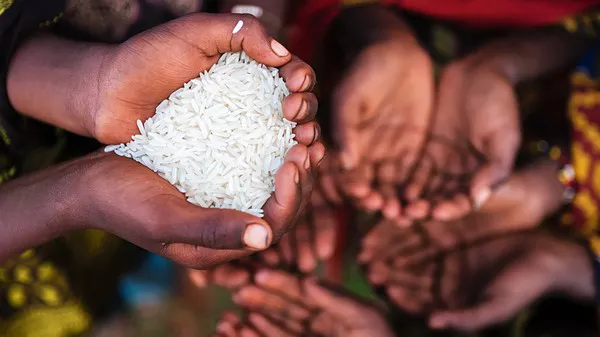In recent days, efforts by aid workers from the U.S.-based humanitarian organization Anera have made headway in delivering approximately 47,000 hot meals to residents in Gaza. The CEO of Anera, Sean Carroll, acknowledges the logistical challenges that accompanied this endeavor, but underscores that the aid provided is far from sufficient to meet the dire needs of the population.
Carroll explains that the portions of chicken and rice delivered are often shared among multiple family members and represent the primary meal for the day. He emphasizes the critical nature of this aid, warning that without it, people may face severe hunger and the combined threat of dehydration and malnutrition.
Humanitarian groups have been working tirelessly to mobilize the remaining food supplies within Gaza while awaiting approval for safe passage across the Egyptian border from the governments of Israel, Egypt, and the United States.
On Thursday, an agreement brokered by the United Nations between Egypt and Israel, allowing some aid to enter Gaza, was described by the World Health Organization as a “starting point.” Dr. Richard Brennan, the WHO’s Regional Emergency Director for the Eastern Mediterranean Region, acknowledged that the process of delivering aid to those in need is a complex and protracted endeavor.
The situation in Gaza has grown increasingly dire as Israel has imposed a blockade since an attack by Hamas fighters, who control the Gaza Strip, resulted in casualties and hostages. Access to basic necessities, particularly bread, has become severely limited, with fuel and energy shortages causing most flour mills and bakeries to cease operations.
In the midst of these challenges, residents in Gaza are making do with whatever food they can find, often queuing for hours to obtain bread. Fresh water is also in short supply, necessitating careful management and rationing within households.
Meanwhile, over 300 tons of food, including fortified biscuits, date bars, and canned fish, intended to feed nearly a quarter-million people for a week, remains stalled in a line of trucks at the Gaza-Egypt border. Additional aid convoys in Egypt are carrying medical supplies and drinking water, while planeloads of food from Dubai have arrived in the nearby city of Arish.
The timing and quantity of aid permitted under the recent UN-backed agreement remain unclear, though President Joe Biden has indicated that aid could commence shortly. However, at the time of this announcement, only a fraction of the aid convoys had been cleared for transit, leaving the Rafah crossing congested with humanitarian aid vehicles.
According to Steve Taravella, a spokesperson for the World Food Programme, Gaza residents are now facing hunger as they ration their dwindling food supplies. Taravella estimates that the World Food Programme has approximately two weeks’ worth of food supplies ready for distribution within Gaza.
Aid groups unable to cross the border are working to allocate the limited food resources remaining in Gaza to those in dire need. Sean Carroll of Anera reports that the shops and food retailers he collaborates with in Gaza now have only 2-3 days’ worth of food supplies.
Moreover, the critical shortage of water, sanitation, and nutrition heightens the risk of infectious disease outbreaks, particularly in a region where hospitals are already overwhelmed by the number of wounded patients.
Even before the current crisis, a significant portion of the Gaza Strip’s population struggled with food scarcity. The World Food Programme estimates that approximately one-third of Palestinians in Gaza were already food insecure, meaning they had to sell their possessions or use essential resources to maintain a basic diet. Roughly 80% of the population required humanitarian aid.
In a heartbreaking twist, some of the very individuals working in Gaza’s food-aid system have suffered personal losses. Sean Carroll reveals that two of Anera’s staff members lost numerous family members in recent bombings, highlighting the tragic toll of the conflict.
The situation is further complicated by ongoing violence near the southern border with Egypt, which has hindered efforts to establish a secure route for aid delivery. Even if aid is permitted to move according to the UN-brokered agreement, humanitarian groups stress the importance of establishing a secure humanitarian corridor with safety guarantees to facilitate the safe distribution of aid and protect civilians seeking assistance.

